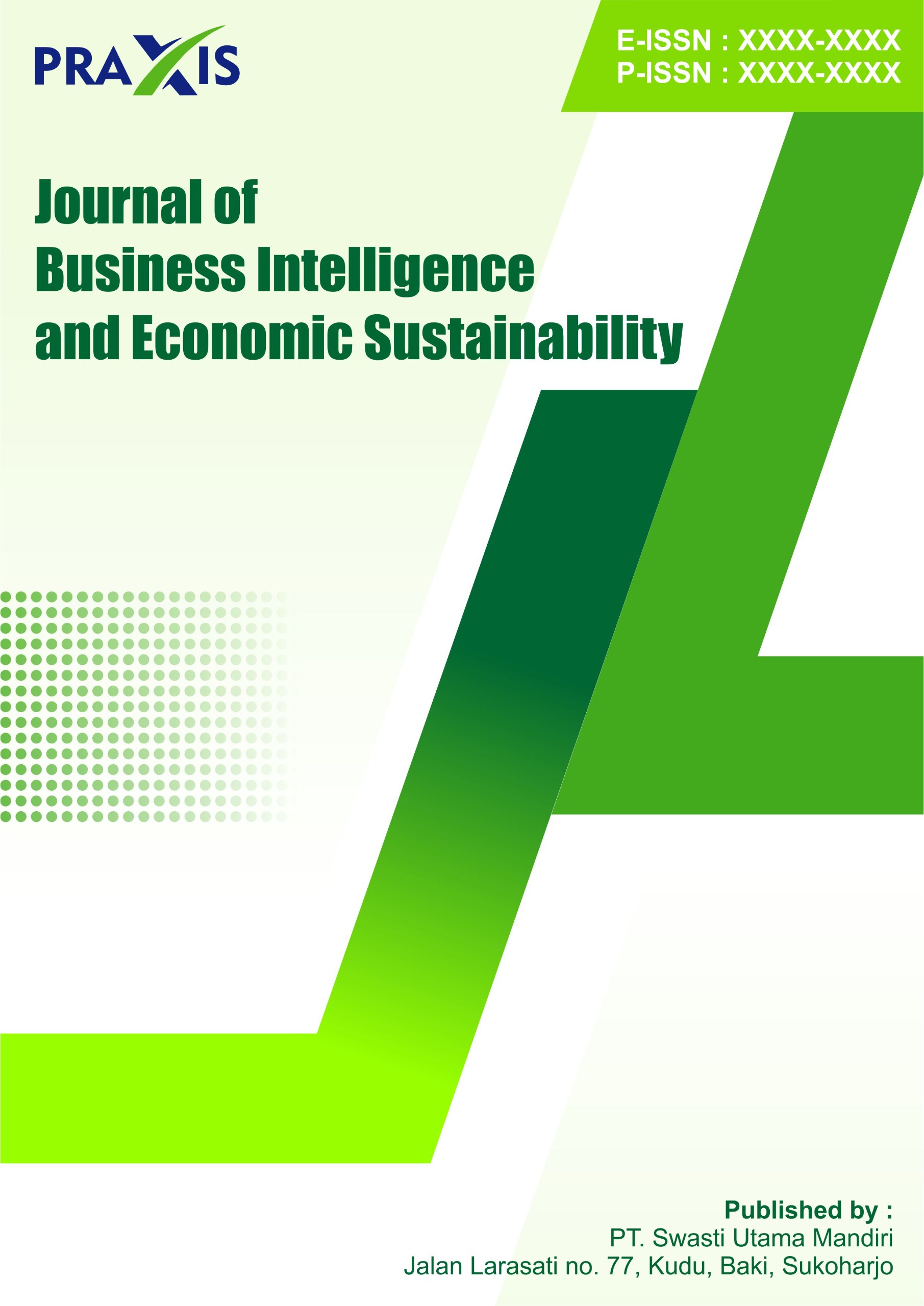Factors Influencing Distribution In Islamic Banking Companies In Indonesia
Main Article Content
Abstract
ABSTRACT
This study aims to determine the effect of Capital Adequacy Ratio (CAR), Non Performing Financing (NPF), Inflation and BI rate on Financing Distribution in Islamic Banking Companies in Indonesia. This type of research is quantitative research. This research uses secondary data from the Indonesia Stock Exchange. The sample in this research is 40 using purposive sampling technique. In analyzing the data using multiple linear regression analysis test, t test, F test and coefficient of determination. . The results of the classical assumption test have met the requirements to continue to the multiple linear regression test. Based on the results of the data processing obtained, the inflation rate has a positive and significant effect on financing distribution, Non Performing Financing (NPF) has a negative but significant effect on financing distribution, Capital Adequacy Ratio (CAR) and BI rate have a negative but not significant effect on financing distribution. The results of the determination coefficient calculation are 54% while the remaining 46% are influenced by other variables.
Article Details

This work is licensed under a Creative Commons Attribution 4.0 International License.
How to Cite
References
Ali, M. S. (1996). Analysing Inflation: Monetary and Real Theories. The Pakistan Development Review, 35(4II), 761–771. https://doi.org/10.30541/v35i4IIpp.761-771
Atisu, J. C., Mensah, N., Alipoe, S. A., & Rahman, S. A.-. (2024). The Effect Of Non-Performing Loans On The Financial Performance Of Commercial Banks In Ghana. IOSR Journal of Economics and Finance, 15(5), 42–48. https://doi.org/10.9790/5933-1505054248
Ereda Melaku, W. (2020). Determinants of Inflation in Africa: A Systematic Review. International Journal of Management and Fuzzy Systems, 6(4), 59. https://doi.org/10.11648/j.ijmfs.20200604.11
Hoang, K., Tran, S., Nguyen, D., & Nguyen, L. (2024). Bank capital, institutional quality and bank stability: International evidence. International Journal of Revenue Management, 14(1), 33–53. https://doi.org/10.1504/IJRM.2024.135965
Ilyas, R. (2015). Financing Concept In Sharia Banking. Research Journal, 9(1). https://doi.org/10.21043/jupe.v9i1.859
Izam Zamali, Astary, J., Mamuji, M., Karima, N. K., & Misbahul Munir. (2024). Faktor Yang Mempengaruhi Non Performing Financing Perbankan Syariah di Indonesia. Islamic Economics and Business Review, 3(1). https://doi.org/10.59580/iesbir.v3i1.7025
Juliani Wulandari, Bunga Aura Putri Sulistyono, David Maulana Verdiansyah, Wisanggeni Wahyu Lintang B.S, & Renny Oktafia. (2024). Basic Concept of Financing in Sharia Banking. Journal Of Business Economics And Management, 2(2), 165–171. https://doi.org/10.59024/jise.v2i2.687
Krichene, N. & NKrichene@imf.org. (2008). Recent Inflationary Trends in World Commodities Markets. IMF Working Papers, 08(130), 1. https://doi.org/10.5089/9781451869897.001
Maksum, M. (2023). The Mechanism of Avoiding Riba in Islamic Financial Institutions: Experiences of Indonesia and Malaysia. JURIS (Jurnal Ilmiah Syariah), 22(2), 235. https://doi.org/10.31958/juris.v22i2.6952
Quynh, N. T. N., & Trung, N. D. (2024). Determinant of Capital Adequacy Ratio: Evidence from Commercial Banks in Vietnam. In N. Ngoc Thach, V. Kreinovich, D. T. Ha, & N. D. Trung (Eds.), Optimal Transport Statistics for Economics and Related Topics (Vol. 483, pp. 480–497). Springer Nature Switzerland. https://doi.org/10.1007/978-3-031-35763-3_34
Raimi, L., Abdur-Rauf, I. A., & Olaide Raimi, B. (2025). Interdependence of halal entrepreneurship and Islamic finance for creating a strong halal ecosystem. Journal of Islamic Marketing, 16(3), 929–954. https://doi.org/10.1108/JIMA-05-2023-0162
Saragih, I., Saragi, J. B., Gulo, T. N., & Fitrawaty, F. (2024). The Effect of Money Supply and BI Rate on the Inflation Rate in Indonesia for the 2010-2023 Period. EKOMA :
Journal of Economics, Management, Accounting, 4(1), 2490–2498. https://doi.org/10.56799/ekoma.v4i1.5644
Tama Putra Saratian, E., Rokhmatul Aysa, I., & Sudiana, U. (2024). The Effect of Implementing Sharia Principles in the Financial Industry on Economic Stability: Case Study at Bank BTPN Syariah. Al Urwah : Sharia Economics Journal, 2(01), 50–57. https://doi.org/10.61536/alurwah.v2i01.50
Varela García, N. (2023). Inflation. In S. Hsu (Ed.), Elgar Encyclopedia of Financial Crises (pp. 209–213). Edward Elgar Publishing. https://doi.org/10.4337/9781800377363.ch48

